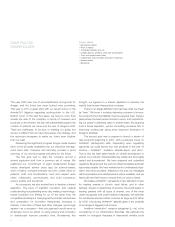Amgen 2000 Annual Report Download - page 12
Download and view the complete annual report
Please find page 12 of the 2000 Amgen annual report below. You can navigate through the pages in the report by either clicking on the pages listed below, or by using the keyword search tool below to find specific information within the annual report.
14
CHRONIC
KIDNEY DISEASE
EPOGEN
®
(Epoetin alfa)
End-Stage Renal Disease Patients
Anemia
It is believed that more than 3 million people in the United
States have signs of chronic kidney disease. The approx-
imately 250,000 of these people whose disease has
progressed to kidney failure must undergo regular dialysis
treatments to remove wastes from their blood. These patients
have a condition known as end-stage renal disease (ESRD).
Nearly 12 years ago, Amgen’s first product, EPOGEN®,
revolutionized the treatment of anemia for ESRD patients
undergoing dialysis. EPOGEN®
supplements dialysis patients’
inadequate supply of erythropoietin, a protein produced by the
kidneys to stimulate oxygen-carrying red blood cell supply.
Appropriate anemia management lessens fatigue, improves
cognitive and physical functioning, and has allowed many
dialysis patients to regain the vitality and freedom to participate
more actively in life, without the need for blood transfusions.
Amgen’s late-stage product candidate,
ARANESP™
(darbepoetin alfa), may represent an important advance for
anemic patients with chronic kidney disease. Through
molecular engineering, Amgen scientists developed ARANESP™
to permit less-frequent dosing than EPOGEN®.
Just as important, because we have retained exclusive
rights for ARANESP™, Amgen may be able to work with doctors
earlier to help simplify anemia management for many more
patients in the U.S. and around the world. If approved by
regulatory agencies, doctors may start treating anemia from
chronic kidney disease with ARANESP™ early in the disease’s
progression, before patients require dialysis treatment. This
early stage of kidney disease is known as chronic renal insuf-
ficiency (CRI).
Of the more than 3 million patients with chronic kidney
disease in the U.S., more than 1 million patients have CRI, and
350,000 of these patients with CRI could be anemic. Only a
small proportion of these patients are treated for their anemia,
despite a growing awareness that when there are fewer circu-
lating red blood cells the heart has to work harder and that this
condition may result in cardiovascular disease. The potential
benefit of less frequent dosing may allow more of these
patients to have their anemia treated.
Amgen is now introducing a program called the Renal
Anemia Management Period (RAMP) to nephrologists, the doc-
tors who manage kidney disease patients. RAMP helps doctors
identify anemic patients with CRI sooner and manage their
anemia earlier. Additionally, Amgen is supporting the devel-
opment of guidelines by the National Kidney Foundation for the
treatment of all stages of kidney disease —the Kidney Disease
Outcomes Quality Initiative (KDOQI). We believe that earlier
treatment of anemia could have important benefits for patients.
A further complication for patients with chronic kidney
failure is the development of secondary hyperparathyroidism.
In patients with this condition, the parathyroid glands detect
low levels of calcium and increase production of parathyroid
hormone (PTH) —the most important regulator of body calcium.
Abnormally high levels of PTH may result in many comp-
lications, including weak bones and abnormal calcium
deposits in blood vessels and other soft tissues.
Amgen’s calcimimetics program may offer benefits to
patients with chronic kidney disease and secondary hyperpara-
thyroidism. Encouraging data from phase 2 studies, published
in the past year, suggest that treatment with small-molecule
calcimimetics results in dose-dependent decreases in PTH
levels and may provide effective reduction of calcium levels.
Amgen is proud to be developing and delivering important
therapeutics to growing numbers of patients worldwide and is
dedicated to remaining at the forefront of renal care.
























